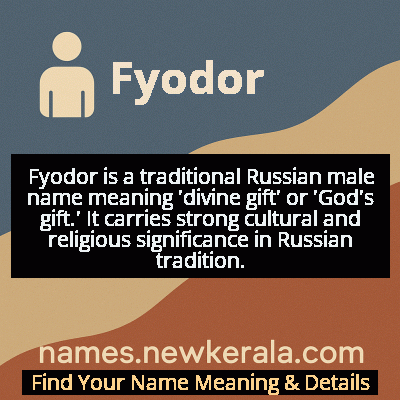Fyodor Name Meaning & Details
Origin, Popularity, Numerology Analysis & Name Meaning of Fyodor
Discover the origin, meaning, and cultural significance of the name FYODOR. Delve into its historical roots and explore the lasting impact it has had on communities and traditions.
Name
Fyodor
Gender
Male
Origin
Russian
Lucky Number
2
Meaning of the Name - Fyodor
Fyodor is a traditional Russian male name meaning 'divine gift' or 'God's gift.' It carries strong cultural and religious significance in Russian tradition.
Fyodor - Complete Numerology Analysis
Your Numerology Number
Based on Pythagorean Numerology System
Ruling Planet
Moon
Positive Nature
Diplomatic, friendly, artistic, empathetic.
Negative Traits
Over-sensitive, moody, indecisive, prone to self-pity.
Lucky Colours
Green, cream, white.
Lucky Days
Monday.
Lucky Stones
Pearl, moonstone.
Harmony Numbers
1, 3, 4.
Best Suited Professions
Diplomats, mediators, caregivers, artists.
What People Like About You
Cooperative spirit, friendliness, artistic talent.
Famous People Named Fyodor
Fyodor Dostoevsky
Novelist
Authored masterpieces of psychological fiction including 'Crime and Punishment'
Fyodor Tyutchev
Poet
Created profound philosophical poetry that shaped Russian literary tradition
Fyodor Chaliapin
Opera singer
Revolutionized operatic performance with his powerful bass voice and dramatic acting
Fyodor Ushakov
Naval commander
Undefeated admiral who established Russian naval supremacy in the Black Sea
Name Variations & International Equivalents
Click on blue names to explore their detailed meanings. Gray names with will be available soon.
Cultural & Historical Significance
Extended Personality Analysis
People named Fyodor are commonly associated with intellectual depth, philosophical inclination, and emotional intensity. They tend to be profound thinkers who enjoy exploring complex ideas and moral dilemmas, often displaying remarkable insight into human nature. Their thoughtful nature is typically balanced by strong principles and loyalty to their beliefs, making them reliable and steadfast individuals. Fyodors often possess a natural gravitas that commands respect, combined with a dry wit that emerges in comfortable settings. They are frequently drawn to academic, artistic, or philosophical pursuits where their analytical minds and creative thinking can flourish. While they may appear reserved initially, they form deep, meaningful relationships and demonstrate fierce loyalty to loved ones. Their combination of intellectual curiosity and emotional sensitivity can sometimes lead to introspection or melancholy, but it also gives them unique perspective and wisdom. Overall, the name Fyodor suggests someone who values truth, depth, and authenticity in all aspects of life.
Modern Usage & Popularity
In contemporary Russia, Fyodor has experienced a significant revival as part of the broader trend toward traditional names that began in the post-Soviet era. While not reaching the popularity of names like Alexander or Maxim, it maintains a stable presence particularly among educated urban families and those with strong cultural awareness. The name is often chosen by parents who value Russian literary heritage and seek a name with intellectual prestige. Recent decades have seen Fyodor transition from being perceived as somewhat old-fashioned to being regarded as classic and sophisticated. Its usage is concentrated in major cultural centers and among families with higher education levels, where its associations with Dostoevsky and Russian cultural greatness are particularly appreciated. The name continues to convey depth, tradition, and intellectual seriousness while avoiding the trendiness of more fashionable names.
Symbolic & Spiritual Meanings
Symbolically, Fyodor represents the intersection of divine grace and human intellect, embodying the concept that true wisdom is a gift from God. The name carries metaphorical significance as a bridge between spiritual aspiration and earthly existence, reflecting the Russian philosophical tradition of seeking higher meaning in everyday life. It symbolizes the depth of the Russian soul—that quality of emotional and spiritual intensity often considered characteristic of Russian identity. Fyodor also represents cultural endurance and continuity, having maintained its essential character through centuries of social and political transformation. The name metaphorically suggests someone who carries both the burden and blessing of deep consciousness, capable of profound insight but also vulnerable to existential questioning. In a broader sense, Fyodor symbolizes the Russian intellectual tradition itself—the ongoing dialogue between faith and reason, tradition and progress, that has defined much of Russian cultural history.

